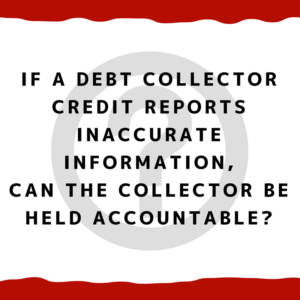If a debt collector credit reports inaccurate information, can the collector be held accountable?
“If a debt collector credit reports inaccurate information, can the collector be held accountable?”
There are two laws involved in false credit reporting by a debt collector: the Fair Debt Collection Practices Act and the Fair Credit Reporting Act. If a debt collector knows or should know that he is reporting false information, he violates the FDCPA (Fair Debt Collection Practices Act).
The FDCPA only applies if the collector is subject to this law. Three basic requirements:
- It must be a consumer debt, rather than a business debt.
- You must be dealing with the debt collector rather than the original creditor.
- If the collector falls under the FDCPA, that they are in violation of the law if they are reporting false information and they know it.
The Fair Credit Reporting Act (FCRA) also applies to this situation. You get your credit report, you look at it. You say, “Wait a minute, I don’t owe this debt collector $5,000. I settled with them two years ago for $3,000. I own them zero, but they’re reporting I owe two or maybe they’re reporting I owe the whole $5,000.”
This is false credit reporting, which violates the FDCPA and it can violate the FCRA.
Under the FCRA, you can dispute the error through the credit bureaus. If you provide proper proof, they are required to investigate. This includes going to the debt collector, if necessary, to figure out if you are right in your dispute.
You may provide enough information that the credit bureau decides they do not have to talk to the debt collector. If they do talk to the debt collector and the debt collector tells them to keep the error on your credit report, then that’s a violation of the Fair Credit Reporting Act.
If you’ve given enough information to the credit bureau and they keep it, then the credit bureau is also violating the FCRA.
The credit bureaus are places like Equifax, Experian, and TransUnion.
If there is a violation of the law, typically the best action to take is to sue in federal court. You’ll receive money damages if you’re successful. The price of a lawsuit tends to prompt these guys quickly to fix your credit errors when they realize they’ve been sued in a federal court.
If we can help you, feel free to call us at 205-879-2447 or fill out our online contact form here.
Thanks for watching the video and reading this article.
